2019届二轮复习语法专题 冠词和代词课件(44张)
文档属性
| 名称 | 2019届二轮复习语法专题 冠词和代词课件(44张) |

|
|
| 格式 | zip | ||
| 文件大小 | 1.1MB | ||
| 资源类型 | 教案 | ||
| 版本资源 | 通用版 | ||
| 科目 | 英语 | ||
| 更新时间 | 2019-03-20 00:00:00 | ||
图片预览


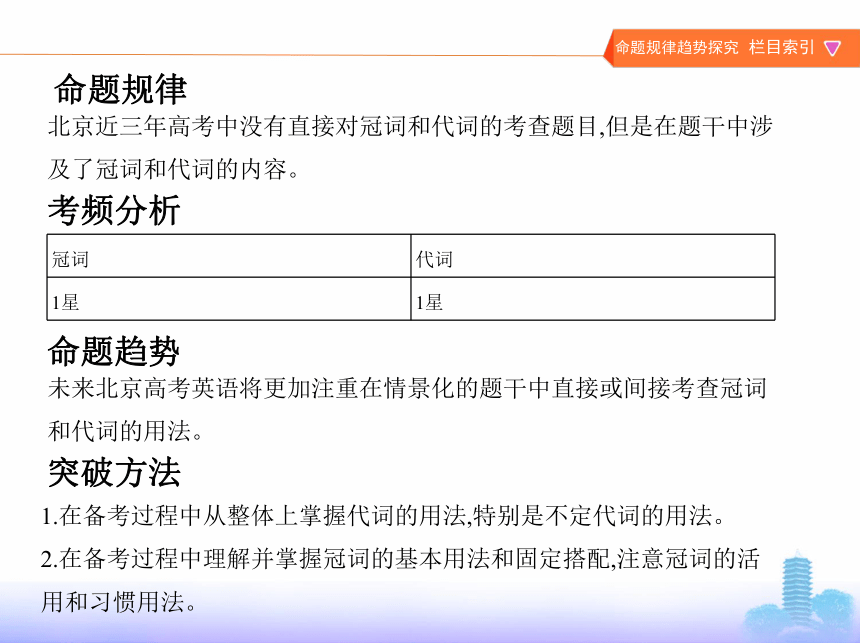

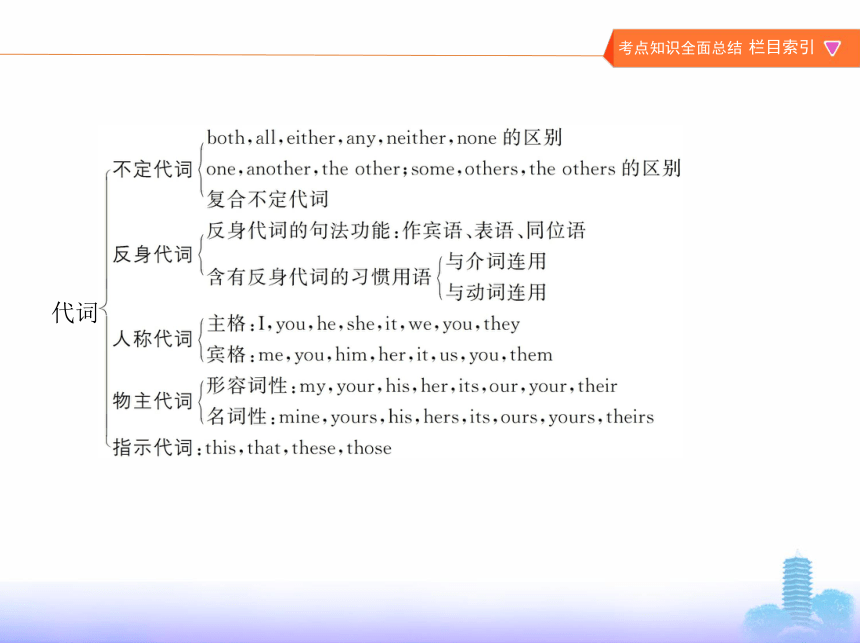
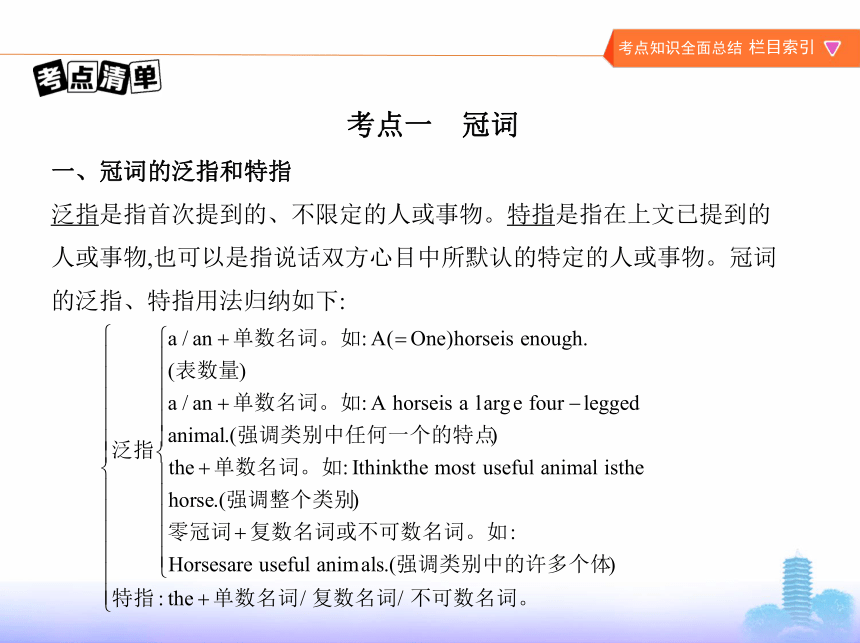
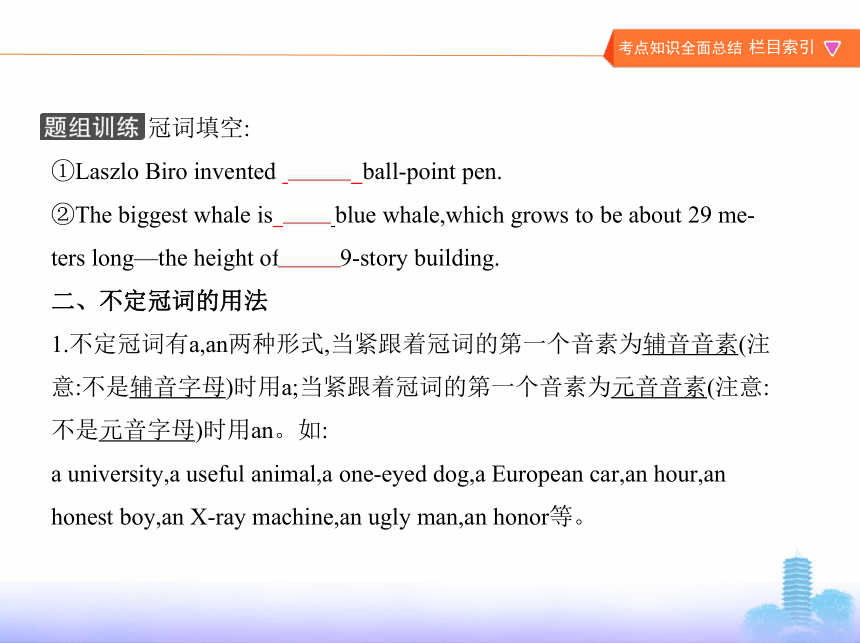
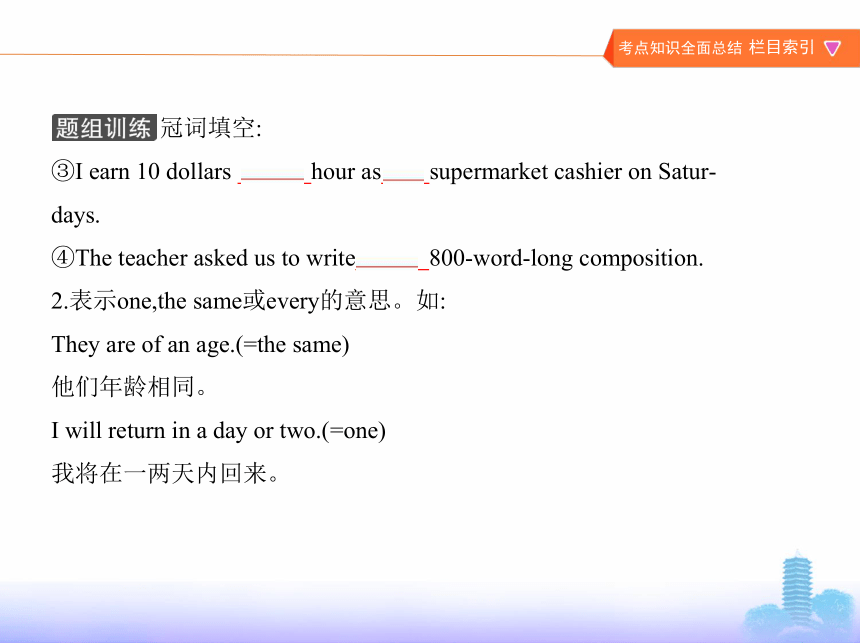
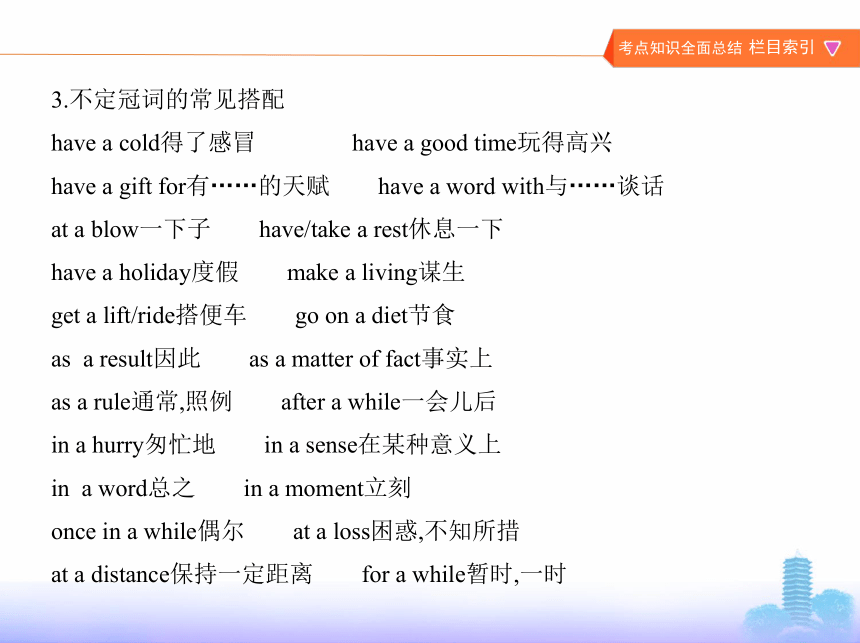
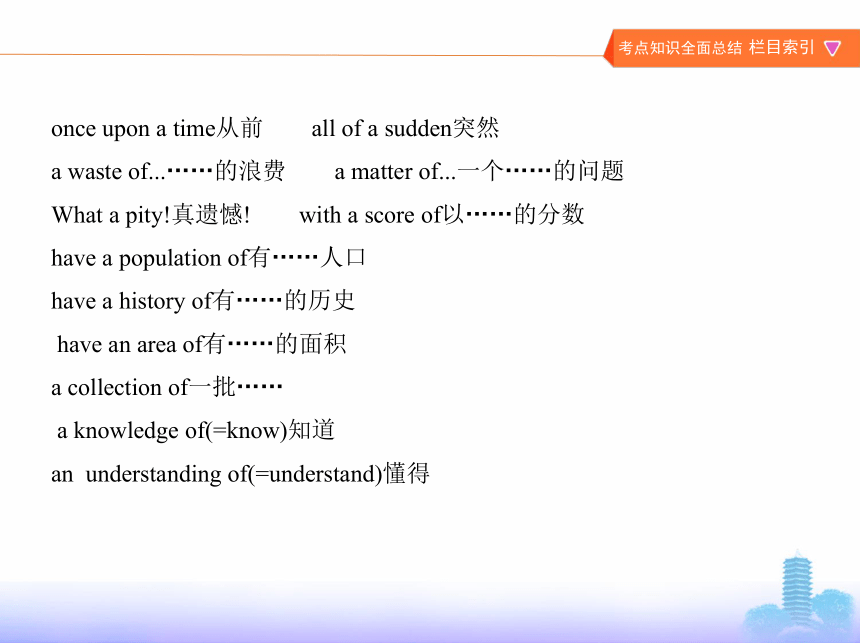
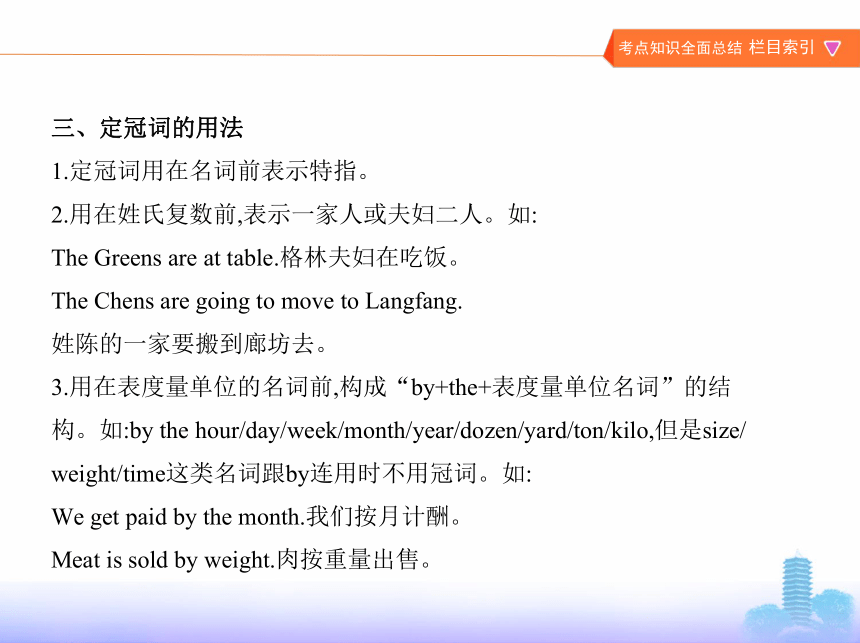
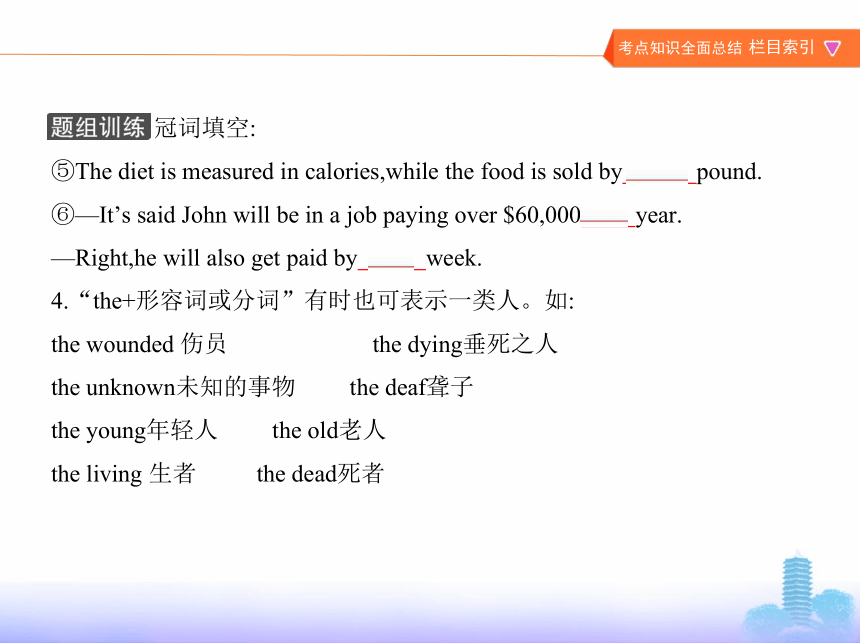
文档简介
课件44张PPT。2019届二轮复习语法专题冠词和代词考纲解读命题规律趋势探究北京近三年高考中没有直接对冠词和代词的考查题目,但是在题干中涉
及了冠词和代词的内容。命题规律考频分析命题趋势未来北京高考英语将更加注重在情景化的题干中直接或间接考查冠词
和代词的用法。突破方法1.在备考过程中从整体上掌握代词的用法,特别是不定代词的用法。
2.在备考过程中理解并掌握冠词的基本用法和固定搭配,注意冠词的活 用和习惯用法。冠词?考点知识全面总结代词? 考点一 冠词
一、冠词的泛指和特指
泛指是指首次提到的、不限定的人或事物。特指是指在上文已提到的 人或事物,也可以是指说话双方心目中所默认的特定的人或事物。冠词 的泛指、特指用法归纳如下:
? 冠词填空:
①Laszlo Biro invented the????ball-point pen.
②The biggest whale is the?blue whale,which grows to be about 29 me- ters long—the height of a????9-story building.
二、不定冠词的用法
1.不定冠词有a,an两种形式,当紧跟着冠词的第一个音素为辅音音素(注 意:不是辅音字母)时用a;当紧跟着冠词的第一个音素为元音音素(注意: 不是元音字母)时用an。如:
a university,a useful animal,a one-eyed dog,a European car,an hour,an honest boy,an X-ray machine,an ugly man,an honor等。 冠词填空:
③I earn 10 dollars an????hour as a??supermarket cashier on Satur- days.
④The teacher asked us to write an????800-word-long composition.
2.表示one,the same或every的意思。如:
They are of an age.(=the same)
他们年龄相同。
I will return in a day or two.(=one)
我将在一两天内回来。3.不定冠词的常见搭配
have a cold得了感冒 have a good time玩得高兴
have a gift for有……的天赋 have a word with与……谈话
at a blow一下子 have/take a rest休息一下
have a holiday度假 make a living谋生
get a lift/ride搭便车 go on a diet节食
as a result因此 as a matter of fact事实上
as a rule通常,照例 after a while一会儿后
in a hurry匆忙地 in a sense在某种意义上
in a word总之 in a moment立刻
once in a while偶尔 at a loss困惑,不知所措
at a distance保持一定距离 for a while暂时,一时once upon a time从前 all of a sudden突然
a waste of...……的浪费 ????a matter of...一个……的问题
What a pity!真遗憾! with a score of以……的分数
have a population of有……人口
have a history of有……的历史
have an area of有……的面积
a collection of一批……
a knowledge of(=know)知道
an understanding of(=understand)懂得三、定冠词的用法
1.定冠词用在名词前表示特指。
2.用在姓氏复数前,表示一家人或夫妇二人。如:
The Greens are at table.格林夫妇在吃饭。
The Chens are going to move to Langfang.
姓陈的一家要搬到廊坊去。
3.用在表度量单位的名词前,构成“by+the+表度量单位名词”的结 构。如:by the hour/day/week/month/year/dozen/yard/ton/kilo,但是size/ weight/time这类名词跟by连用时不用冠词。如:
We get paid by the month.我们按月计酬。
Meat is sold by weight.肉按重量出售。 冠词填空:
⑤The diet is measured in calories,while the food is sold by the???pound.
⑥—It’s said John will be in a job paying over $60,000 a???year.
—Right,he will also get paid by the??week.
4.“the+形容词或分词”有时也可表示一类人。如:
the wounded 伤员 ????the dying垂死之人
the unknown未知的事物 the deaf聋子
the young年轻人 the old老人
the living 生者 the dead死者5.“动词+sb.+介词+the+身体某一部位”结构中的the不可用形容词性
物主代词代替。如:
take sb. by the arm抓某人的胳膊
An apple fell from the tree and hit him on the head.
一个苹果从树上落下,砸在他的头上。
此外,在be red in the face(脸红),be lame in the right leg(右腿瘸),be blind in the left eye(左眼瞎)等结构中,名词前也要用the。
6.用在某些固定结构中。如:
in the end最后,终于 in the daytime在白天
get into/in the habit of养成……习惯
make the most/best of充分利用
in the distance在远处 in the way挡路on the whole总之 on the right/left在右/左边
at the same time同时 at the moment此刻
for the time being暂时 in the public eye广为人知的
go to the doctor’s去看医生
by the way顺便提一下,附带问一句
the other day(=a few days ago)几天前
on the radio/phone通过广播/在打电话
on the spot在场,到场,立即,马上,当场
to tell(you)the truth说实话,老实说
go to the cinema/theatre去看电影/去看戏
not in the least(=not at all)一点儿也不on (the) one hand...,on the other hand一方面……,另外一方面……
the more,less,etc...,the more,less,etc...
(用于表示两个事物按照同一程度变化)越……越……,愈……愈……
四、零冠词的用法
1.不可数名词、复数名词表泛指,用零冠词。如:
Father went to his doctor for advice about his heart trouble.
父亲去了医生那里寻求关于他的心脏病的建议。
Dogs can hear much better than humans.
狗的听觉比人类灵敏得多。
2.名词前已有this,that,my,your,some,each,no,any等指示代词、物主代词 及限定词限定时,该名词前不可再用冠词。如: She is not my type of woman.
她不是我心目中的那类女人。
3.系动词turn(变成)后的单数名词作表语,用零冠词。如:
Has he turned scientist?他成为科学家了吗?
4.用在某些固定短语中。如:
pen and ink笔墨 master and servant主仆
husband and wife夫妻 father and son父子
day and night日日夜夜 sun and moon日月
hand in hand手拉手 by weight论重量
ahead of time提前 face to face面对面
under repair在修理之中 in case of 万一,以防by mistake错误地 from morning till night从早到晚
in place of替代 by law根据法律
for certain肯定地 at war在交战
on board在船(或火车等)上 on second thoughts转念一想
in debt负债 no such boy没有这样的男孩子
by air/land/water乘飞机/走陆路/走水路
side by side(=shoulder to shoulder)肩并肩地
at noon/dawn(daybreak)/dusk/night/midnight在中午/黎明/黄昏/夜里/半夜
out of work/order/control/date/patience/reach/breath/danger/season失业/出 故障/失控/过时/失去耐心/够不着/上气不接下气/脱离危险/不在旺季
in use/danger/public正被使用/处于危险之中/公开地,当众every few days每隔几天 catch fire起火
come/rank first名列第一 give birth to产(仔)
come to light暴露,真相大白
come to power(=take office)上任,掌权
do harm/good to对……有危害/好处
make room for为……腾出空间考点二 代词
一、不定代词
1.both,all,either,any,neither,none的区别如:
I’ve bought two books;you can have either.
我买了两本书;你要哪本都行。
I am sorry I can’t lend you any(money).
对不起,我不能借给你钱。
None of this money is mine.这笔钱没有一点儿是我的。
用不定代词填空:
①He had lost his temper and his health in the war and never found either???? of them again.
②She had lived in New York and Detroit, but she liked neither??? and moved to Huston.2.one,another,the other;some,others,the others的区别 单项填空:
( )③We had a picnic last term and it was a lot of fun,so let??s have ????one this month.
A.the other B.some C.another D.other
( )④The manager believes prices will not rise by more than ????four per-cent.
A.any other B.the other C.another D.other
( )⑤Some of the wheat is from Canada.What about ?????
A.another B.the other C.others D.the restCCD(1)
如:
—How much money do you have?
—None.
——你有多少钱?
—— 一点儿也没有。
If I had some money,I would lend him some,but unfortunately,I have none.3.none, nothing, nobody的区别(none=not any money)
如果我有钱的话,我就借给他了,但遗憾的是,我没钱。
I wished someone could help me,but there was no one at the moment.(no one=not anyone)
我希望当时有人能帮我,但当时没有人。
(2)none后面可跟of短语,而something/anything/everything/nothing和 someone/anyone/everyone/no one却不能。如:
As we were asleep,none of us heard the sound.
我们都睡着了,因此我们当中没有一个人听到那个声音。
None of them knew about the plan because it was kept as a secret.
他们当中没有一个人知道那项计划,因为它被当作一个秘密来保守。 用none,nobody(no one),nothing填空:
⑥I have so many clothes, but none???? of them are new.
⑦ No one/Nobody???? can be good at something for 40 years if he doesn??t love it.
⑧Swimming is my favorite sport and I think nothing???? is better than swim- ming for me to keep fit.
二、人称代词和反身代词
1.人称代词
(1)人称代词有主格和宾格之分,主格用作主语,宾格一般用作宾语,但在 简短的对话中单独使用或在疑问代词、否定词后也可使用宾格代词。 如:—Nice to meet you!见到你很高兴!
—Me,too.我也是(很高兴见到你)。
(2)人称代词it
it作人称代词时可以指代前文所提到的人或事物,也可以指代性别不明 的婴儿或谈话双方都明白的事物或情况。如:
“Where is your car?” “It’s in the garage.”
“你的车在哪里?”“在车库里。”
What a beautiful baby—is it a boy?
多漂亮的宝宝——是男孩吗?
注意:it除用作人称代词外,还有其他用法,如下:
①指代时间、距离、自然现象等。如:It is half past two now.(指时间)
现在是两点半。
It is 6 miles to the nearest hospital.(指距离)
到最近的医院的距离是6英里。
It is very cold in the room.(指温度)
房间里很冷。
A lovely day,isn’t it?(指天气)
好天气,是吗?
②用作形式主语或形式宾语。如:
The doctor thought it would be good for you to have a holiday.(形式主语) 医生认为度假对你有好处。We feel it our duty to make our country a better place.(形式宾语)
我们觉得让我们的国家成为一个更加美好的地方是我们的责任。
用it作形式主语或形式宾语补全下列句子:
⑨众所周知,在世界上中国人口最多。
It is well known that ????China has the largest population in the world.
⑩据说他们都去看电影了。
It is said that ????all of them have gone to the cinema.
(3)it用于强调句型中(内容见专题九特殊句式)(2)含有反身代词的短语搭配
for oneself亲自
by oneself独自,自动地
to oneself独自享用
enjoy oneself(=have a good time)玩得开心,过得愉快
Behave yourself!(=Be polite!Show good manners!)规矩点!
absent oneself缺席;不参加2.反身代词
(1)反身代词的句法功能devote oneself to专心于;献身于
apply oneself to专心致志于
adapt oneself to适应于
treat oneself to sth.用……犒劳自己
make oneself at home不要客气
seat oneself(=sit)坐
think for oneself(=form one’s own opinion)独立思考(形成自己的看法,自 行决定) 用含反身代词的介词短语完成下列句子:
?The machine will start by itself? ???in a few seconds.
?When I dine in a restaurant,I like a table to myself ????.一、抽象/物质名词的具体化
1.某些表示特性、状态、情感、情绪等的抽象名词,如果仅仅表示“概 念”,是不可数名词,表示泛指时,要与零冠词连用;但如果这类名词被具 体化,则表示具体的人或事物,表示泛指时,需与不定冠词连用。如:
surprise惊奇,惊讶 ????a surprise一件意外的事
pleasure愉快,高兴 ????a pleasure一件快乐的事
pressure压力 ????a pressure一种压力
concern关心,忧虑 ???? a concern一件令人关切的事
success成功 ????a success一个/件成功的人/事
failure失败 ????a failure一个/件失败的人/事comfort安慰 ????a comfort令人感到安慰的人或事物
pity同情, 怜悯 ????a pity遗憾的事,可悲的事
worry担忧,担心,忧愁 ????a worry令人担忧的事
honour尊重,尊敬 ????an honour一个引起尊敬/重的人或事物
wonder惊奇,惊叹,惊愕 ????a wonder令人惊奇的事,奇观 冠词填空:
① 不填??S(s)uccess lies not so much in luck as in hard work.
②His new book was a???great success.
2.rain,snow,fog,wind,gas,fire,crop,coffee,tea,food,drink,ice,chalk,sugar等 物质名词可以转化为可数名词,与不定冠词连用表示“一场,一种,一份 等”。用复数形式表示类别、数量。如:
a heavy rain/snow一场大雨/雪
two drinks两杯饮料 ????foods各种各样的食品
two ices两份冰激凌 ????two teas两杯茶二、具体名词的抽象化
school,college,hospital,court,prison,bed,table,church等是可数名词,有具 体的意义,但这类名词可被抽象化从而只突出与之有关的活动,却失去 了原来的具体意义。这时,这类名词前需用零冠词。如:
go to school去上学 at table在吃饭
in prison蹲监狱 go to church去做礼拜
三、纯专有名词的普通化
纯专有名词被普通化时,被普通化的专有名词可与冠词连用。如:
He is a Lei Feng.
他是个活雷锋。
Is that a Monet?
那是莫奈的画吗?A Mr.Smith is waiting for you outside.
有个叫史密斯的先生正在外面等你。
四、表示世界上独一无二的事物的名词前的冠词活用
用在表示世界上独一无二的事物的名词(如:sun,moon,world,sky等)前, 往往用定冠词,但当这些名词前有描述性定语时,可用不定冠词表示泛 指。如:
The moon travels around the earth.
月亮绕着地球转。
A new moon is hanging in the sky.
一轮新月悬挂在天空中。
We have friends all over the world.我们的朋友遍天下。They are trying to make a new world.
他们正在努力创造一个新世界。
五、形容词比较等级前的冠词活用
形容词比较级前用定冠词表示“两者当中较……的”,而形容词比较级 前用不定冠词则表示“更……”。most前用定冠词表示“三者或三者 以上中最……的”;most前用不定冠词,并无比较含义,most相当于 very。如:
Which is the larger country,Canada or Australia?
加拿大和澳大利亚,哪个国家更大?
It is a most useful book.(=a very useful)它是一本非常有用的书。六、序数词前的冠词活用
“the+序数词”表顺序,而“a/an+序数词”表“又一,再一”;序数词修 饰动词时是副词,因此不必与冠词连用。如:
Can you give me a second chance,please?(=another chance)
请再给我一次机会好吗?
He was only 5 years old when I first saw him.(adv.)
当我第一次见到他时,他只有5岁。七、any, every和each的区别如:
I have many books here,and you can take any one.
我这里有很多书,你可以拿任何一本。Every student has to take the examination.
=All the students have to take the examination.
每个学生都必须参加考试。
Each of my children goes to a different school.
我的几个孩子各自在不同的学校上学。
Each(one) of the tickets costs 10 dollars.
=The tickets cost 10 dollars each.
=The tickets each cost 10 dollars.每张票10美元。(后两句中的each作同位语)
Every man is not honest.=Not every man is honest.
并非每个人都诚实。八、many,much,few,little,a few,a little的区别 用many,much,few,little,a few,a little完成下列句子:
③ Many??(很多)people don’t have much????(很多)food.
④ Few???(很少)people can live to be 100 years old.
⑤You have done little ?(很少)for me.
⑥Come in and have a little????(一点)whisky.
九、部分否定和全部否定
all,both,everyone,everybody,everything以及“every+名词”都表示全部 肯定;
no one,none,nobody,nothing,not...any以及“no+名词”都表示全部否定;当not出现在含有表示全部肯定的不定代词的句子中时,不管not在它们之前
Not all of them smoke.=All of them don’t smoke.
他们当中不是所有的人都抽烟。
All of the boys are very clever,but none of them can work out this problem.
所有的男孩儿都很聪明,但他们当中没有一个能解出这道题。
Such a thing can’t be found everywhere.
这种事并非到处可见。还是在它们之后都表示部分否定。此外,not与总括性副词如everywhere,always,wholly,altogether等连用时也表示部分否定。
如:请认真完成高考题组训练 模拟预测题组训练
2.在备考过程中理解并掌握冠词的基本用法和固定搭配,注意冠词的活 用和习惯用法。冠词?考点知识全面总结代词? 考点一 冠词
一、冠词的泛指和特指
泛指是指首次提到的、不限定的人或事物。特指是指在上文已提到的 人或事物,也可以是指说话双方心目中所默认的特定的人或事物。冠词 的泛指、特指用法归纳如下:
? 冠词填空:
①Laszlo Biro invented the????ball-point pen.
②The biggest whale is the?blue whale,which grows to be about 29 me- ters long—the height of a????9-story building.
二、不定冠词的用法
1.不定冠词有a,an两种形式,当紧跟着冠词的第一个音素为辅音音素(注 意:不是辅音字母)时用a;当紧跟着冠词的第一个音素为元音音素(注意: 不是元音字母)时用an。如:
a university,a useful animal,a one-eyed dog,a European car,an hour,an honest boy,an X-ray machine,an ugly man,an honor等。 冠词填空:
③I earn 10 dollars an????hour as a??supermarket cashier on Satur- days.
④The teacher asked us to write an????800-word-long composition.
2.表示one,the same或every的意思。如:
They are of an age.(=the same)
他们年龄相同。
I will return in a day or two.(=one)
我将在一两天内回来。3.不定冠词的常见搭配
have a cold得了感冒 have a good time玩得高兴
have a gift for有……的天赋 have a word with与……谈话
at a blow一下子 have/take a rest休息一下
have a holiday度假 make a living谋生
get a lift/ride搭便车 go on a diet节食
as a result因此 as a matter of fact事实上
as a rule通常,照例 after a while一会儿后
in a hurry匆忙地 in a sense在某种意义上
in a word总之 in a moment立刻
once in a while偶尔 at a loss困惑,不知所措
at a distance保持一定距离 for a while暂时,一时once upon a time从前 all of a sudden突然
a waste of...……的浪费 ????a matter of...一个……的问题
What a pity!真遗憾! with a score of以……的分数
have a population of有……人口
have a history of有……的历史
have an area of有……的面积
a collection of一批……
a knowledge of(=know)知道
an understanding of(=understand)懂得三、定冠词的用法
1.定冠词用在名词前表示特指。
2.用在姓氏复数前,表示一家人或夫妇二人。如:
The Greens are at table.格林夫妇在吃饭。
The Chens are going to move to Langfang.
姓陈的一家要搬到廊坊去。
3.用在表度量单位的名词前,构成“by+the+表度量单位名词”的结 构。如:by the hour/day/week/month/year/dozen/yard/ton/kilo,但是size/ weight/time这类名词跟by连用时不用冠词。如:
We get paid by the month.我们按月计酬。
Meat is sold by weight.肉按重量出售。 冠词填空:
⑤The diet is measured in calories,while the food is sold by the???pound.
⑥—It’s said John will be in a job paying over $60,000 a???year.
—Right,he will also get paid by the??week.
4.“the+形容词或分词”有时也可表示一类人。如:
the wounded 伤员 ????the dying垂死之人
the unknown未知的事物 the deaf聋子
the young年轻人 the old老人
the living 生者 the dead死者5.“动词+sb.+介词+the+身体某一部位”结构中的the不可用形容词性
物主代词代替。如:
take sb. by the arm抓某人的胳膊
An apple fell from the tree and hit him on the head.
一个苹果从树上落下,砸在他的头上。
此外,在be red in the face(脸红),be lame in the right leg(右腿瘸),be blind in the left eye(左眼瞎)等结构中,名词前也要用the。
6.用在某些固定结构中。如:
in the end最后,终于 in the daytime在白天
get into/in the habit of养成……习惯
make the most/best of充分利用
in the distance在远处 in the way挡路on the whole总之 on the right/left在右/左边
at the same time同时 at the moment此刻
for the time being暂时 in the public eye广为人知的
go to the doctor’s去看医生
by the way顺便提一下,附带问一句
the other day(=a few days ago)几天前
on the radio/phone通过广播/在打电话
on the spot在场,到场,立即,马上,当场
to tell(you)the truth说实话,老实说
go to the cinema/theatre去看电影/去看戏
not in the least(=not at all)一点儿也不on (the) one hand...,on the other hand一方面……,另外一方面……
the more,less,etc...,the more,less,etc...
(用于表示两个事物按照同一程度变化)越……越……,愈……愈……
四、零冠词的用法
1.不可数名词、复数名词表泛指,用零冠词。如:
Father went to his doctor for advice about his heart trouble.
父亲去了医生那里寻求关于他的心脏病的建议。
Dogs can hear much better than humans.
狗的听觉比人类灵敏得多。
2.名词前已有this,that,my,your,some,each,no,any等指示代词、物主代词 及限定词限定时,该名词前不可再用冠词。如: She is not my type of woman.
她不是我心目中的那类女人。
3.系动词turn(变成)后的单数名词作表语,用零冠词。如:
Has he turned scientist?他成为科学家了吗?
4.用在某些固定短语中。如:
pen and ink笔墨 master and servant主仆
husband and wife夫妻 father and son父子
day and night日日夜夜 sun and moon日月
hand in hand手拉手 by weight论重量
ahead of time提前 face to face面对面
under repair在修理之中 in case of 万一,以防by mistake错误地 from morning till night从早到晚
in place of替代 by law根据法律
for certain肯定地 at war在交战
on board在船(或火车等)上 on second thoughts转念一想
in debt负债 no such boy没有这样的男孩子
by air/land/water乘飞机/走陆路/走水路
side by side(=shoulder to shoulder)肩并肩地
at noon/dawn(daybreak)/dusk/night/midnight在中午/黎明/黄昏/夜里/半夜
out of work/order/control/date/patience/reach/breath/danger/season失业/出 故障/失控/过时/失去耐心/够不着/上气不接下气/脱离危险/不在旺季
in use/danger/public正被使用/处于危险之中/公开地,当众every few days每隔几天 catch fire起火
come/rank first名列第一 give birth to产(仔)
come to light暴露,真相大白
come to power(=take office)上任,掌权
do harm/good to对……有危害/好处
make room for为……腾出空间考点二 代词
一、不定代词
1.both,all,either,any,neither,none的区别如:
I’ve bought two books;you can have either.
我买了两本书;你要哪本都行。
I am sorry I can’t lend you any(money).
对不起,我不能借给你钱。
None of this money is mine.这笔钱没有一点儿是我的。
用不定代词填空:
①He had lost his temper and his health in the war and never found either???? of them again.
②She had lived in New York and Detroit, but she liked neither??? and moved to Huston.2.one,another,the other;some,others,the others的区别 单项填空:
( )③We had a picnic last term and it was a lot of fun,so let??s have ????one this month.
A.the other B.some C.another D.other
( )④The manager believes prices will not rise by more than ????four per-cent.
A.any other B.the other C.another D.other
( )⑤Some of the wheat is from Canada.What about ?????
A.another B.the other C.others D.the restCCD(1)
如:
—How much money do you have?
—None.
——你有多少钱?
—— 一点儿也没有。
If I had some money,I would lend him some,but unfortunately,I have none.3.none, nothing, nobody的区别(none=not any money)
如果我有钱的话,我就借给他了,但遗憾的是,我没钱。
I wished someone could help me,but there was no one at the moment.(no one=not anyone)
我希望当时有人能帮我,但当时没有人。
(2)none后面可跟of短语,而something/anything/everything/nothing和 someone/anyone/everyone/no one却不能。如:
As we were asleep,none of us heard the sound.
我们都睡着了,因此我们当中没有一个人听到那个声音。
None of them knew about the plan because it was kept as a secret.
他们当中没有一个人知道那项计划,因为它被当作一个秘密来保守。 用none,nobody(no one),nothing填空:
⑥I have so many clothes, but none???? of them are new.
⑦ No one/Nobody???? can be good at something for 40 years if he doesn??t love it.
⑧Swimming is my favorite sport and I think nothing???? is better than swim- ming for me to keep fit.
二、人称代词和反身代词
1.人称代词
(1)人称代词有主格和宾格之分,主格用作主语,宾格一般用作宾语,但在 简短的对话中单独使用或在疑问代词、否定词后也可使用宾格代词。 如:—Nice to meet you!见到你很高兴!
—Me,too.我也是(很高兴见到你)。
(2)人称代词it
it作人称代词时可以指代前文所提到的人或事物,也可以指代性别不明 的婴儿或谈话双方都明白的事物或情况。如:
“Where is your car?” “It’s in the garage.”
“你的车在哪里?”“在车库里。”
What a beautiful baby—is it a boy?
多漂亮的宝宝——是男孩吗?
注意:it除用作人称代词外,还有其他用法,如下:
①指代时间、距离、自然现象等。如:It is half past two now.(指时间)
现在是两点半。
It is 6 miles to the nearest hospital.(指距离)
到最近的医院的距离是6英里。
It is very cold in the room.(指温度)
房间里很冷。
A lovely day,isn’t it?(指天气)
好天气,是吗?
②用作形式主语或形式宾语。如:
The doctor thought it would be good for you to have a holiday.(形式主语) 医生认为度假对你有好处。We feel it our duty to make our country a better place.(形式宾语)
我们觉得让我们的国家成为一个更加美好的地方是我们的责任。
用it作形式主语或形式宾语补全下列句子:
⑨众所周知,在世界上中国人口最多。
It is well known that ????China has the largest population in the world.
⑩据说他们都去看电影了。
It is said that ????all of them have gone to the cinema.
(3)it用于强调句型中(内容见专题九特殊句式)(2)含有反身代词的短语搭配
for oneself亲自
by oneself独自,自动地
to oneself独自享用
enjoy oneself(=have a good time)玩得开心,过得愉快
Behave yourself!(=Be polite!Show good manners!)规矩点!
absent oneself缺席;不参加2.反身代词
(1)反身代词的句法功能devote oneself to专心于;献身于
apply oneself to专心致志于
adapt oneself to适应于
treat oneself to sth.用……犒劳自己
make oneself at home不要客气
seat oneself(=sit)坐
think for oneself(=form one’s own opinion)独立思考(形成自己的看法,自 行决定) 用含反身代词的介词短语完成下列句子:
?The machine will start by itself? ???in a few seconds.
?When I dine in a restaurant,I like a table to myself ????.一、抽象/物质名词的具体化
1.某些表示特性、状态、情感、情绪等的抽象名词,如果仅仅表示“概 念”,是不可数名词,表示泛指时,要与零冠词连用;但如果这类名词被具 体化,则表示具体的人或事物,表示泛指时,需与不定冠词连用。如:
surprise惊奇,惊讶 ????a surprise一件意外的事
pleasure愉快,高兴 ????a pleasure一件快乐的事
pressure压力 ????a pressure一种压力
concern关心,忧虑 ???? a concern一件令人关切的事
success成功 ????a success一个/件成功的人/事
failure失败 ????a failure一个/件失败的人/事comfort安慰 ????a comfort令人感到安慰的人或事物
pity同情, 怜悯 ????a pity遗憾的事,可悲的事
worry担忧,担心,忧愁 ????a worry令人担忧的事
honour尊重,尊敬 ????an honour一个引起尊敬/重的人或事物
wonder惊奇,惊叹,惊愕 ????a wonder令人惊奇的事,奇观 冠词填空:
① 不填??S(s)uccess lies not so much in luck as in hard work.
②His new book was a???great success.
2.rain,snow,fog,wind,gas,fire,crop,coffee,tea,food,drink,ice,chalk,sugar等 物质名词可以转化为可数名词,与不定冠词连用表示“一场,一种,一份 等”。用复数形式表示类别、数量。如:
a heavy rain/snow一场大雨/雪
two drinks两杯饮料 ????foods各种各样的食品
two ices两份冰激凌 ????two teas两杯茶二、具体名词的抽象化
school,college,hospital,court,prison,bed,table,church等是可数名词,有具 体的意义,但这类名词可被抽象化从而只突出与之有关的活动,却失去 了原来的具体意义。这时,这类名词前需用零冠词。如:
go to school去上学 at table在吃饭
in prison蹲监狱 go to church去做礼拜
三、纯专有名词的普通化
纯专有名词被普通化时,被普通化的专有名词可与冠词连用。如:
He is a Lei Feng.
他是个活雷锋。
Is that a Monet?
那是莫奈的画吗?A Mr.Smith is waiting for you outside.
有个叫史密斯的先生正在外面等你。
四、表示世界上独一无二的事物的名词前的冠词活用
用在表示世界上独一无二的事物的名词(如:sun,moon,world,sky等)前, 往往用定冠词,但当这些名词前有描述性定语时,可用不定冠词表示泛 指。如:
The moon travels around the earth.
月亮绕着地球转。
A new moon is hanging in the sky.
一轮新月悬挂在天空中。
We have friends all over the world.我们的朋友遍天下。They are trying to make a new world.
他们正在努力创造一个新世界。
五、形容词比较等级前的冠词活用
形容词比较级前用定冠词表示“两者当中较……的”,而形容词比较级 前用不定冠词则表示“更……”。most前用定冠词表示“三者或三者 以上中最……的”;most前用不定冠词,并无比较含义,most相当于 very。如:
Which is the larger country,Canada or Australia?
加拿大和澳大利亚,哪个国家更大?
It is a most useful book.(=a very useful)它是一本非常有用的书。六、序数词前的冠词活用
“the+序数词”表顺序,而“a/an+序数词”表“又一,再一”;序数词修 饰动词时是副词,因此不必与冠词连用。如:
Can you give me a second chance,please?(=another chance)
请再给我一次机会好吗?
He was only 5 years old when I first saw him.(adv.)
当我第一次见到他时,他只有5岁。七、any, every和each的区别如:
I have many books here,and you can take any one.
我这里有很多书,你可以拿任何一本。Every student has to take the examination.
=All the students have to take the examination.
每个学生都必须参加考试。
Each of my children goes to a different school.
我的几个孩子各自在不同的学校上学。
Each(one) of the tickets costs 10 dollars.
=The tickets cost 10 dollars each.
=The tickets each cost 10 dollars.每张票10美元。(后两句中的each作同位语)
Every man is not honest.=Not every man is honest.
并非每个人都诚实。八、many,much,few,little,a few,a little的区别 用many,much,few,little,a few,a little完成下列句子:
③ Many??(很多)people don’t have much????(很多)food.
④ Few???(很少)people can live to be 100 years old.
⑤You have done little ?(很少)for me.
⑥Come in and have a little????(一点)whisky.
九、部分否定和全部否定
all,both,everyone,everybody,everything以及“every+名词”都表示全部 肯定;
no one,none,nobody,nothing,not...any以及“no+名词”都表示全部否定;当not出现在含有表示全部肯定的不定代词的句子中时,不管not在它们之前
Not all of them smoke.=All of them don’t smoke.
他们当中不是所有的人都抽烟。
All of the boys are very clever,but none of them can work out this problem.
所有的男孩儿都很聪明,但他们当中没有一个能解出这道题。
Such a thing can’t be found everywhere.
这种事并非到处可见。还是在它们之后都表示部分否定。此外,not与总括性副词如everywhere,always,wholly,altogether等连用时也表示部分否定。
如:请认真完成高考题组训练 模拟预测题组训练
